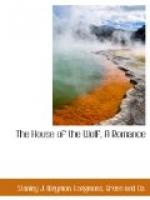All day long we had ridden in great joy; if thoughtless, yet innocent; if selfish, yet thankful; and always blithely, with a great exultation and relief at heart, a great rejoicing for our own sakes and for Kit’s.
Now with the nightfall and the darkness, now when we were near our home, and on the eve of giving joy to another, we grew silent. There arose other thoughts—thoughts of all that had happened since we had last ascended that track; and so our minds turned naturally back to him to whom we owed our happiness—to the giant left behind in his pride and power and his loneliness. The others could think of him with full hearts, yet without shame. But I reddened, reflecting how it would have been with us if I had had my way; if I had resorted in my shortsightedness to one last violent, cowardly deed, and killed him, as I had twice wished to do.
Pavannes would then have been lost almost certainly. Only the Vidame with his powerful troop—we never knew whether he had gathered them for that purpose or merely with an eye to his government—could have saved him. And few men however powerful— perhaps Bezers only of all men in Paris would have dared to snatch him from the mob when once it had sighted him. I dwell on this now that my grandchildren may take warning by it, though never will they see such days as I have seen.
And so we clattered up the steep street of Caylus with a pleasant melancholy upon us, and passed, not without a more serious thought, the gloomy, frowning portals, all barred and shuttered, of the House of the Wolf, and under the very window, sombre and vacant, from which Bezers had incited the rabble in their attack on Pavannes’ courier. We had gone by day, and we came back by night. But we had gone trembling, and we came back in joy.
We did not need to ring the great bell. Jean’s cry, “Ho! Gate there! Open for my lords!” had scarcely passed his lips before we were admitted. And ere we could mount the ramp, one person outran those who came forth to see what the matter was; one outran Madame Claude, outran old Gil, outran the hurrying servants, and the welcome of the house. I saw a slender figure all in white break away from the little crowd and dart towards us, disclosing as it reached me a face that seemed still whiter than its robes, and yet a face that seemed all eyes—eyes that asked the question the lips could not frame.
I stood aside with a low bow, my hat in my hand; and said simply —it was the great effect of my life—“Voila Monsieur!”
And then I saw the sun rise in a woman’s face.
* * * * * *
The Vidame de Bezers died as he had lived. He was still Governor of Cahors when Henry the Great attacked it on the night of the 17th of June, 1580. Taken by surprise and wounded in the first confusion of the assault, he still defended himself and his charge with desperate courage, fighting from street to street, and house to house for five nights and as many days. While he lived Henry’s destiny and the fate of France trembled in the balance. But he fell at length, his brain pierced by the ball of an arquebuse, and died an hour before sunset on the 22nd of June. The garrison immediately surrendered.




